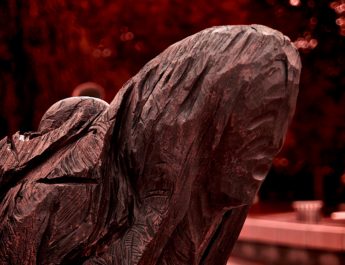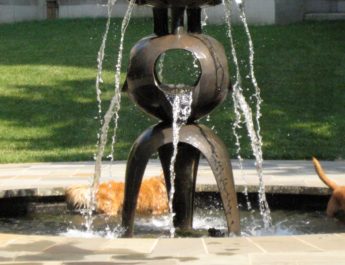Psalm 116:1-9
Transfiguration of the Lord – A Women’s Lectionary
1 I loveA the Lord,B because he has heardC
my voiceD and my supplications.E
A “love” = aheb. This is to love, beloved, friend. It is to have affection for sexually or otherwise.
B “Lord” = YHVH. From havah (to be, become) or hayah (to come to pass, become, be). This is the name of the God of Israel, the self-existent and eternal one, the tetragrammaton. This pronunciation has been lost to time so “Lord” is generally used in its place.
C “heard” = shama. This is to hear, call, consent, or consider. It implies listening intelligently, giving attention, and, because of these two factors, obedience and action are often implied.
D “voice” = qol. This is a sound, used often for human voices. Also used when God speaks or angels, animals or instruments. It can be a cry or a noise, thunder or earthquakes and so on.
E “supplications” = tachanun. 18x in OT. From chanan (beseech, show favor, be gracious; properly, to bend in kindness to someone with less status). This is entreaty, prayer, or supplication. It is looking for favor earnestly.
2 Because he inclinedF his earG to me,
therefore I will callH on him as long as I live.I
F “inclined” = natah. This is to stretch or spread out, to extend, or bend. In can also imply moral deflection.
G “ear” = ozen. This is ear, hearing, audience, show. Properly, it is broadness – applied to its ear in reference to its shape.
H “call” = qara. This is to call or call out – to call someone by name. Also used more broadly for calling forth.
I “as long as I live” = yom. Literally, “in my days.” Root may mean being hot. This is the day in a literal or figurative sense. It can also mean birth, age, daylight, continually or other references to time.
3 The snaresJ of deathK encompassed me;
the pangsL of SheolM laid holdN on me;
J “snares” = chebel. From chabal (to bind, pledge, or wind tight; figuratively, can refer to perverting or destroying something; can also be used of writhing in pain, particularly in reference to childbirth). This is a band, rope, measuring line, noose. It can be a company, territory, or country. It can also refer to a throe of labor or ruin.
K “death” = mavet. From muth (to die in a literal or figurative sense). This can be death, deadliness, the dead, or the place where the dead go. It can be used figuratively for pestilence or ruin.
L “pangs” = metsar. 3x in OT – 2x in the Psalms & 1x in Lamentations. From tsarar (to bind, restrict, narrow, be cramped, an adversary). This is something tight. Figuratively, it is used for distress, pain, or trouble.
M “Sheol” = Sheol. Perhaps from sha’al (to ask, request). This is the place where the dead go, the grace, the underworld.
N “laid hold” = matsa. This is to find, catch or acquire. It can also mean to come forth or appear. Figuratively, this can mean to meet or be together with.
I sufferedO distressP and anguish.Q
O “suffered” = matsa. Same as “laid hold” in v3. See note N above.
P “distress” = tsarah. Related to “pangs” in v3. From tsar (properly, a narrow or constricted place; figuratively, trouble, a pebble, an enemy, anguish, or distress); from tsarar (see note L above). This is tightness, distress, affliction, trouble, or adversary.
Q “anguish” = yagon. 14x in OT. From yagah (to suffer, grieve, afflict). This is grief or sorrow.
4 Then I called on the nameR of the Lord:
“O Lord, I pray,S saveT my life!”U
R “name” = shem. May be from sum (to put, place, set). This is name, fame, renown. A name was thought to indicate something essential about a person – something about their individuality. So, this word can also mean honor, authority, or character.
S “pray” = annah. Related to “love” in v1. 13x in OT– 4x for beg, beseech, entreat; 9x for Alas, O, Ah. Perhaps from ahabah (love); {from aheb (see note A above)} + na (I or we pray, now; used to ask for something). This word is oh, I ask you, now.
T “save” = malat. This is to be smooth, which implies to escape as slipping away from. It can also be release, rescue, deliver, or preserve. It can be used specifically to meaning giving birth or making sparks.
U “life” = nephesh. Related to naphash (to refresh or be refreshed). This is soul, self, person, emotion. It is a breathing creature. Can also refer to appetites and desires.
5 GraciousV is the Lord, and righteous;W
our GodX is merciful.Y
V “gracious” = channun. Related to “supplications” in v1. 13x in OT. From chanan (see note E above). This is gracious, compassionate, merciful, having pity on.
W “righteous” = tsaddiq. From the same as tsedeq (rightness, righteousness, just cause, vindication; that which is right in a natural, moral, or legal sense; abstractly equity; figuratively prosperity). This is just, innocent, righteous, righteous one, or lawful.
X “God” = Elohim.
Y “merciful” = racham. From racham (compassion, tender love, womb, compassion; the womb as that which cherishes the fetus); from the same as rechem (womb). This is to love, fondle, have mercy, have or show compassion.
6 The Lord protectsZ the simple;AA
when I was brought low,BB he savedCC me.
Z “protects” = shamar. This is to keep, watch, or preserve. It means to guard something or to protect it as a thorny hedge protects something.
AA “simple” = pthiy. 19x in OT. From pathah (to be simple, entice, deceive, persuade, allure, be silly); from pethi (simple, silly, foolish, easily deceived); from pathah (to be wide open, deceive, entice, persuade, to be simple, delude). This is open-minded, simple, silly, foolish, or seducible.
BB “brought low” = dalal. 9x in OT. This is to be low, hang, fade, be emptied, become poor, be oppressed.
CC “saved” = yasha. To deliver, defend, help, preserve, rescue, be safe. Properly, to be open, wide or free, which implies being safe. Used causatively, it means to free.
7 Return,DD O my soul,EE to your rest,FF
for the Lord has dealt bountifullyGG with you.
DD “return” = shub. To turn back, return, turn away – literally or figuratively. Doesn’t necessarily imply going back to where you started from. This is also the root verb for the Hebrew word for repentance “teshubah.”
EE “soul” = nephesh. Same as “life” in v4. See note U above.
FF “rest” = menuchah. From manoach (resting place, quiet, home); from nuach (to rest, calm, camp, free, place, remain, satisfy, settle, station, or wait; implies settling down in a literal or figurative sense). This is resting place, consolation, ease, quiet. It is the same word in Psalm 23:2, “he leads me beside the still waters.”
GG “dealt bountifully” = gamal. This is how one deals with someone whether positively or negatively – so to reward, requite. It can also mean to wean or the work that goes into something ripening.
8 For you have deliveredHH my soul from death,
my eyesII from tears,JJ
my feetKK from stumbling.LL
HH “delivered” = chalats. This is to turn back or away in a literal or figurative sense. So, it could be return, break, build, retreat. It doesn’t necessarily imply going back to the place you started.
II “eyes” = ayin. This is eye in a literal or figurative sense so eye, appearance, favor, or a fountain (the eye of the landscape).
JJ “tears” = dimah. From dema (juice, liquor); from dama (to weep). This is tears from weeping.
KK “feet” = regel. This is foot, endurance, or journey. It is a foot as the means of walking and so it implies a step or a greater journey. It can be used euphemistically for private parts.
LL “stumbling” = dechi. 2x in OT. From dachah (to push down, drive, thrust, totter, trip, or chase; to overthrow or an outcast as one has been pushed down/overthrown). This is a stumbling or a push, which implies a fall.
9 I walkMM beforeNN the Lord
in the landOO of the living.PP
MM “walk” = halak. This is go, come, walk. It is walk literally and figuratively and includes people and animals. It can be used figuratively for one’s moral life – how we walk according to God’s way or against it. It can also refer to the walk of life as in the course one’s life takes, the choices we make, etc.
NN “before” = paneh. From panah (to turn, face, appear). This is face in a literal or figurative sense. It could be face, presence, anger, respect. It can also be used of God to indicate divine favor or presence.
OO “land” = erets. Root may mean to be firm. This is earth, ground, field land, or country.
PP “living” = chay. From chayah (to live or keep alive literally or figuratively). This is alive, living, lifetime. It can also be used to describe someone’s age. It can refer to animals, plants, water, or a company or congregation of people. It is life in a very broad sense.
Image credit: “Crying Alone” by frankieleon, 2010.




